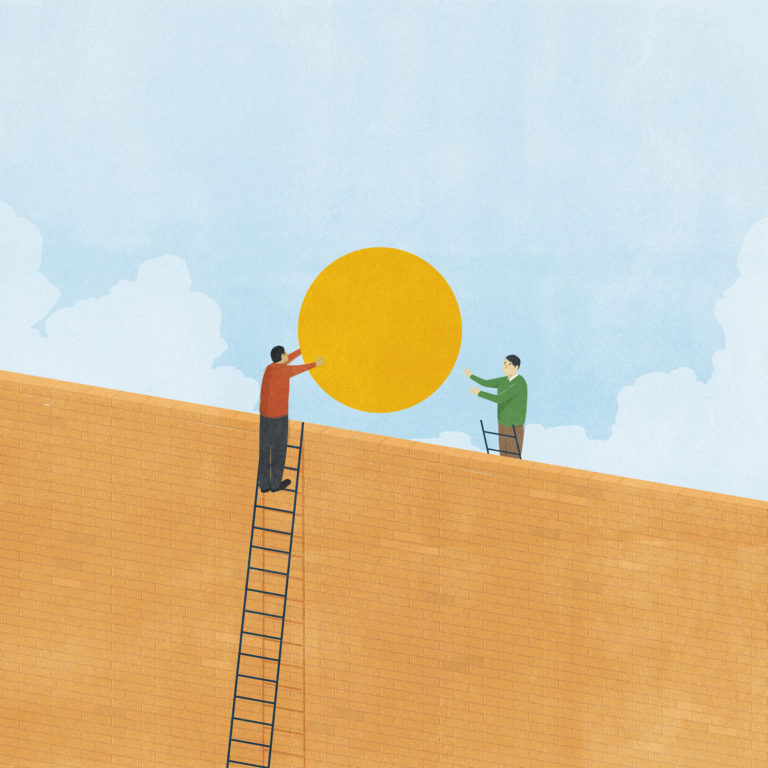It’s ridiculous and, in some ways, a folly to say, ‘Can’t we all just get along?’ But it is the truest thing that I don’t understand why we can’t.
Luis Alberto Urrea

Poet Elizabeth Alexander asks that question. Worlds await when we are present to one another.
Illustration by Andrea Ucini.
It’s ridiculous and, in some ways, a folly to say, ‘Can’t we all just get along?’ But it is the truest thing that I don’t understand why we can’t.
Luis Alberto Urrea
Marilyn Nelson is a storytelling poet. She has taught poetry and contemplative practice to college students and West Point cadets. She brings a contemplative eye to ordinary goodness in the present and to complicated ancestries we’re all reckoning with now. And she imparts a spacious perspective on what “communal pondering” might mean.
Elemental human capacities like friendship and love, teaching and learning, have tremendous, constant, practical force. We don’t think of these in terms of what has given our species the grit to endure through hard times and even evolve in the long run. They’re lived social intelligence, part of the everyday, and so can be hard to see as serious amidst the high tumult of our age. But these kinds of human qualities are what sociologist Nicholas Christakis studies from his Human Nature Lab at Yale and his life generously lived. He offers a wide lens, a broad perspective, that deepens and refreshes.
There is a question rolling around even in the most secular of corners: What do religious people and traditions have to teach as we do the work ahead of repairing, renewing, and remaking our societies, our life together? Krista’s conversation this week with Rabbi Ariel Burger, a student of the late, extraordinary Elie Wiesel, delves into theological and mystical depths that are so much richer and more creative than is often imagined even when that question is raised.
The poet, essayist, and playwright Claudia Rankine says every conversation about race doesn’t need to be about racism. But she says all of us — and especially white people — need to find a way to talk about it, even when it gets uncomfortable. Her bestselling book, Citizen: An American Lyric, catalogued the painful daily experiences of lived racism for people of color. Claudia models how it’s possible to bring that reality into the open — not to fight, but to draw closer. And she shows how we can do this with everyone, from our intimate friends to strangers on airplanes.
The measure of our compassion lies not in our service of those on the margins but in our willingness to see ourselves in kinship. And so that means the decided movement towards awe and giant steps away from judgment.
Greg Boyle
After Arlie Hochschild published her book Strangers in Their Own Land: Anger and Mourning on the American Right, just before the 2016 election, it came to feel prescient. And the conversation Krista had with her in 2018 has now come to point straight to the heart of 2020 — a year in which many of us might say we feel like strangers in our own land and in our own world. Hochschild created a field within sociology looking at the social impact of emotion. She explains how our stories and truths — what we try to debate as issues in our social and political lives — are felt, not merely factual. And she shares why, as a matter of pragmatism, we have to take emotion seriously and do what feels unnatural: get curious and caring about the other side.
Poetry, I tell my students,
is idiosyncratic. Poetry
is where we are ourselves
(though Sterling Brown said
“Every ‘I’ is a dramatic ‘I’”),
digging in the clam flats
for the shell that snaps,
emptying the proverbial pocketbook.
Poetry is what you find
in the dirt in the corner,
overhear on the bus, God
in the details, the only way
to get from here to there.
Poetry (and now my voice is rising)
is not all love, love, love,
and I’m sorry the dog died.
Poetry (here I hear myself loudest)
is the human voice,
and are we not of interest to each other?
“Ars Poetica #100: I Believe” from Crave Radiance by Elizabeth Alexander. Copyright © 2012 by Elizabeth Alexander. Used with permission of the poet.
This poem was originally read in the On Being episode “Words That Shimmer.”
Watch a poetry film version of this on our YouTube channel.
Search results for “”
Filters
/